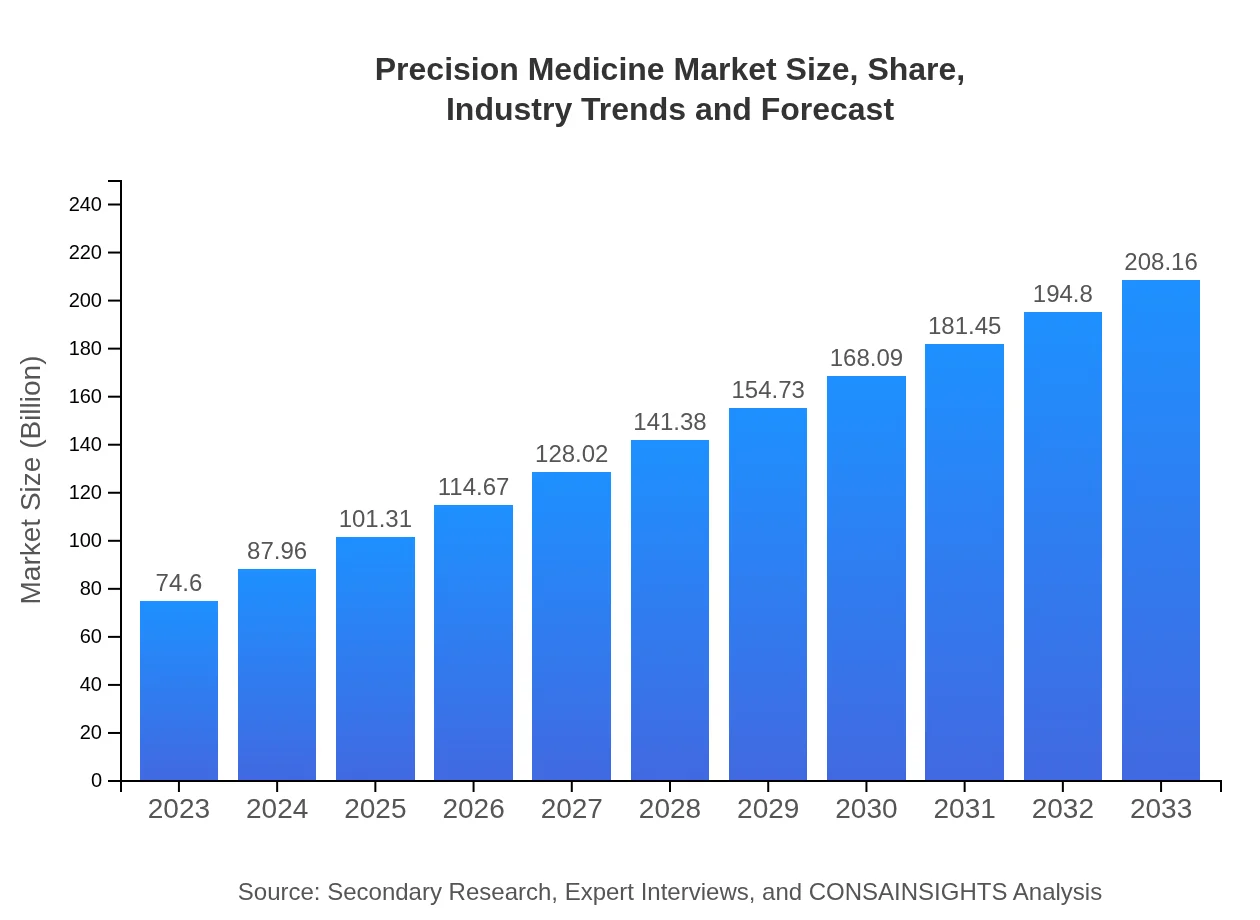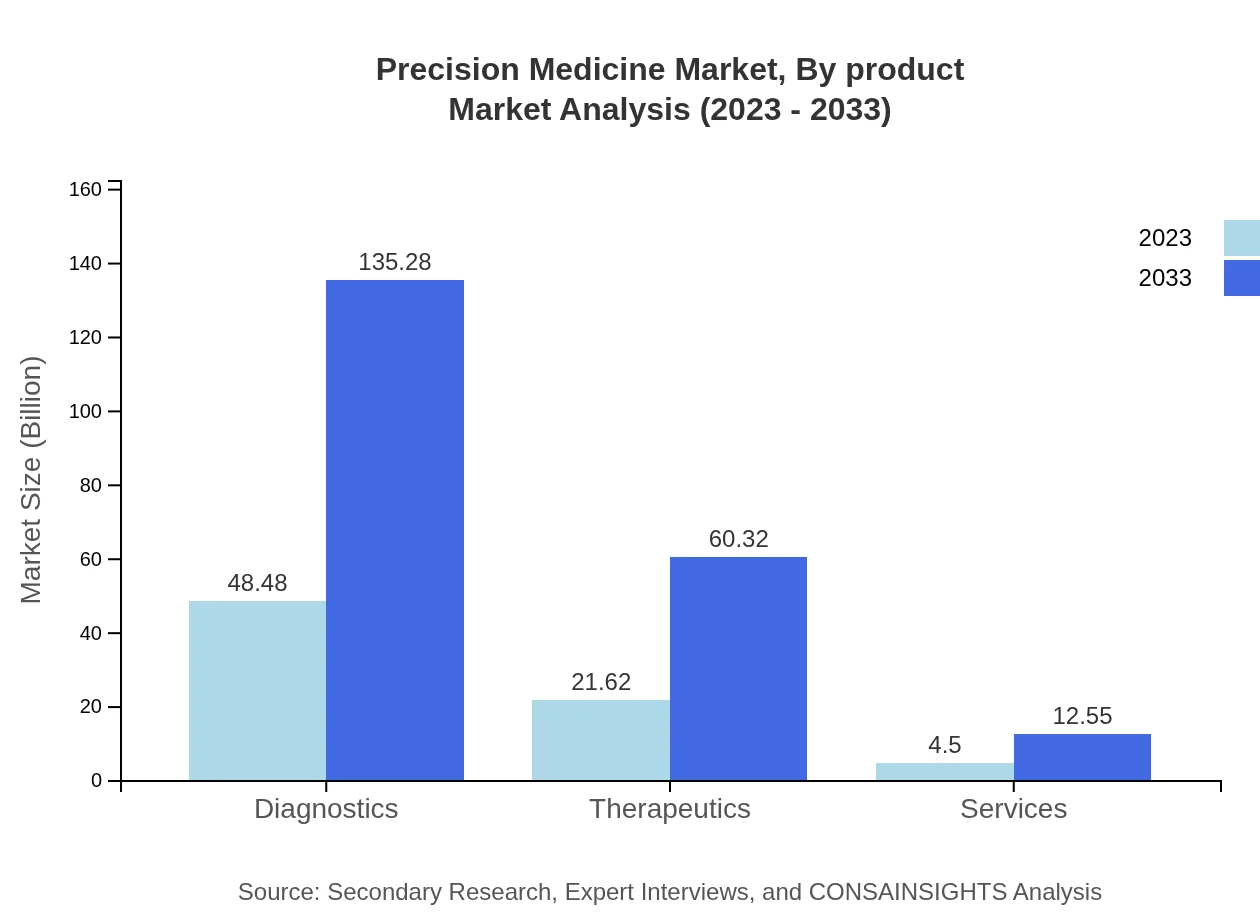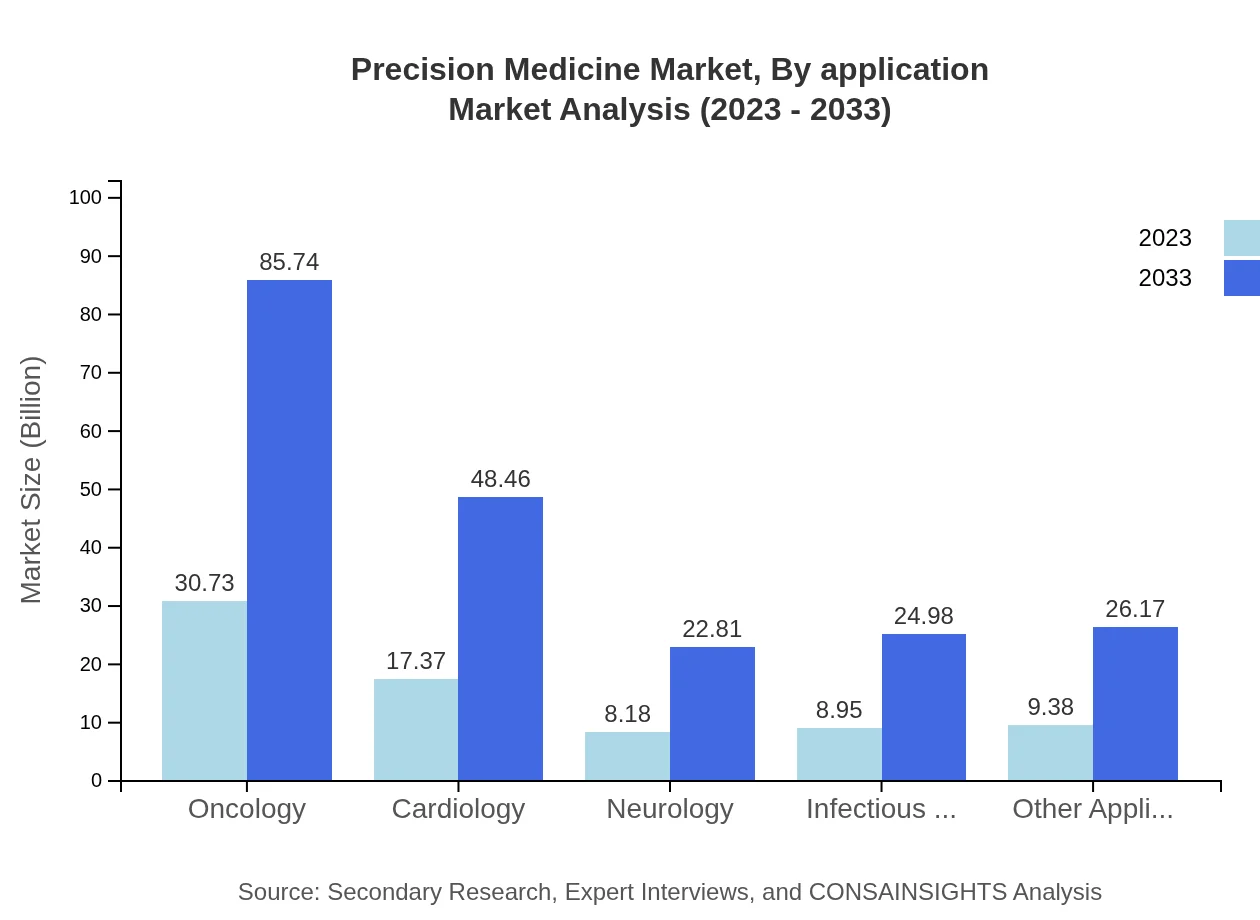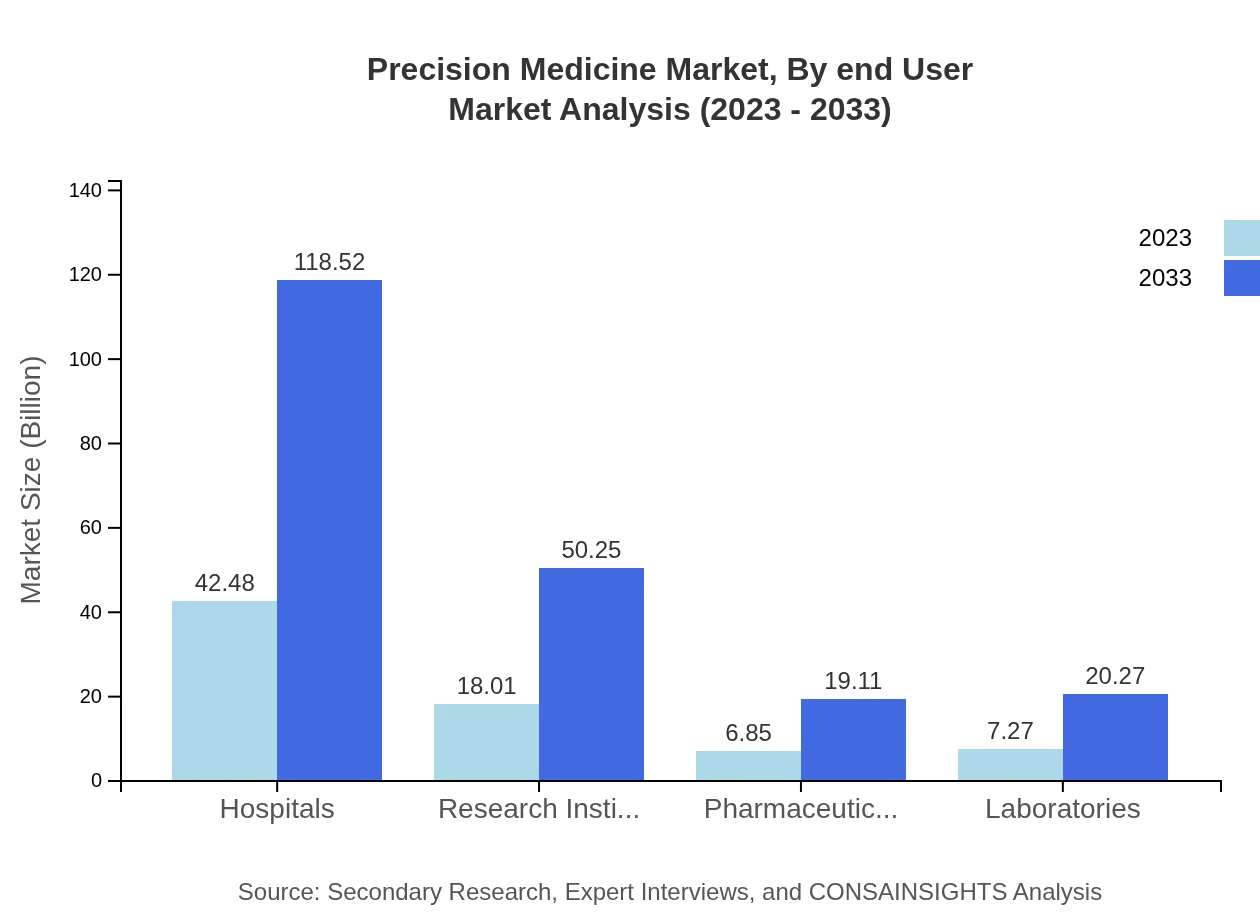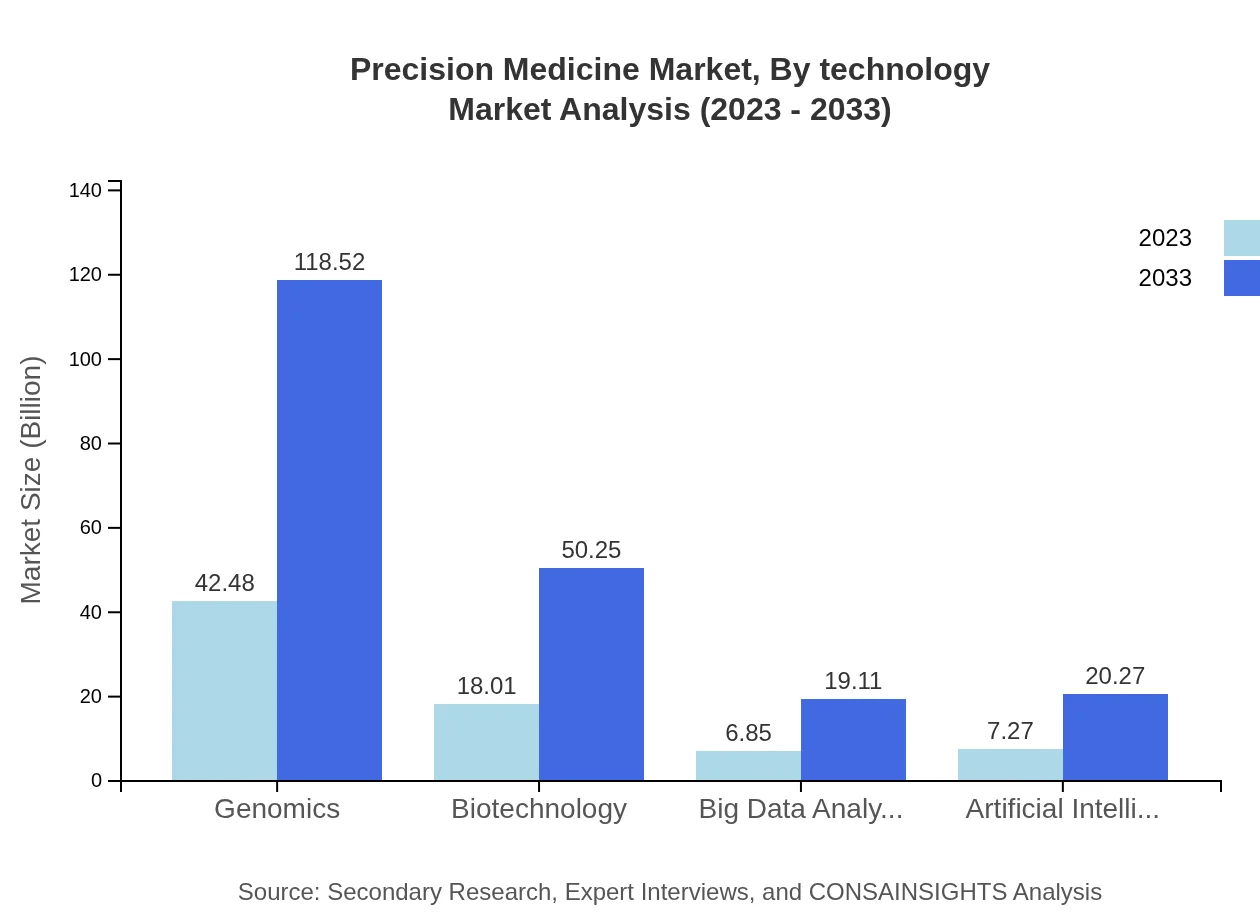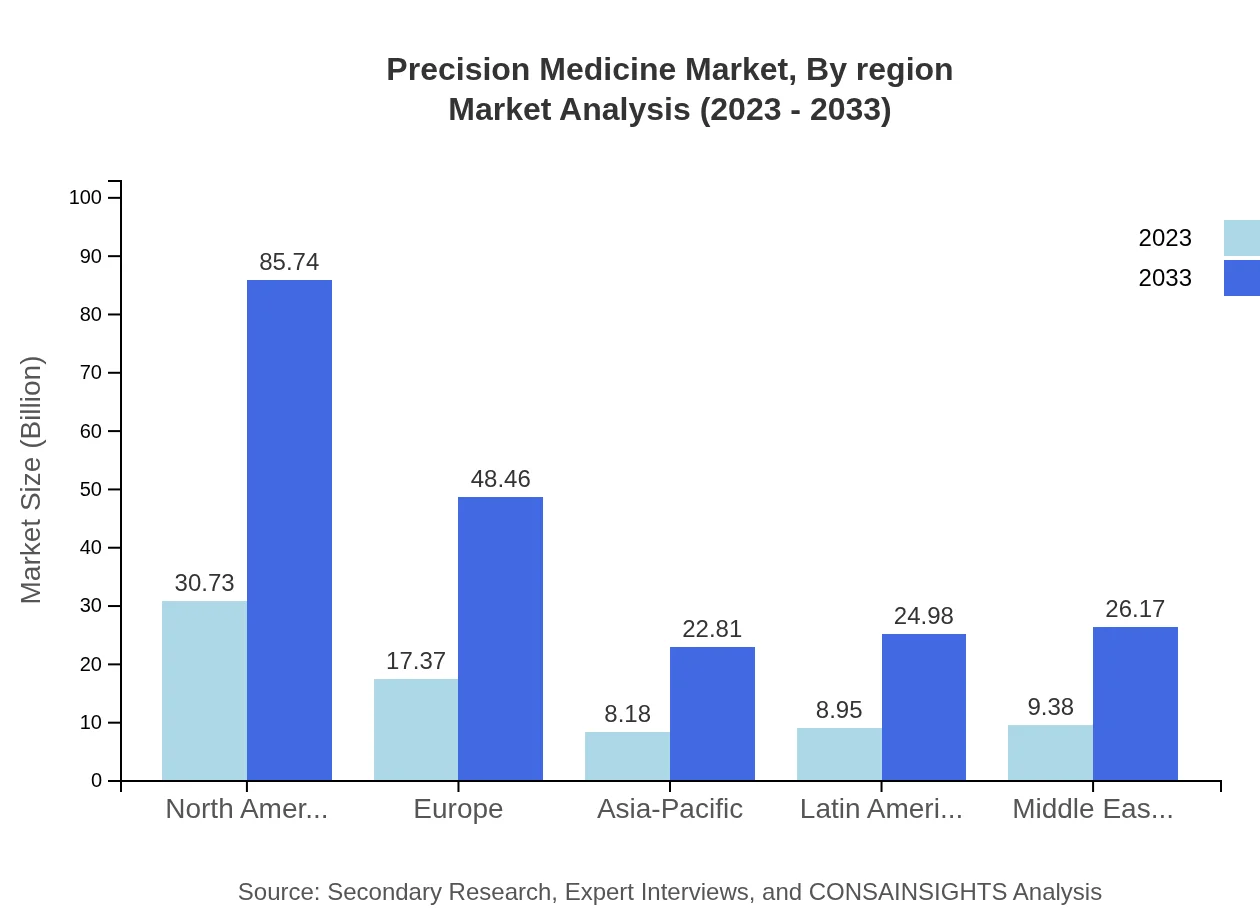Precision Medicine Market Report
Published Date: 31 January 2026 | Report Code: precision-medicine
Precision Medicine Market Size, Share, Industry Trends and Forecast to 2033
This market report provides a comprehensive analysis of the Precision Medicine sector from 2023 to 2033, including insights into market size, growth trends, segmentation, and regional performance, alongside detailing global market leaders and future forecasts.
| Metric | Value |
|---|---|
| Study Period | 2023 - 2033 |
| 2023 Market Size | $74.60 Billion |
| CAGR (2023-2033) | 10.4% |
| 2033 Market Size | $208.16 Billion |
| Top Companies | Illumina, Inc., Thermo Fisher Scientific, Roche Holdings AG, AbbVie Inc., GRAIL, Inc. |
| Last Modified Date | 31 January 2026 |
Precision Medicine Market Overview
Customize Precision Medicine Market Report market research report
- ✔ Get in-depth analysis of Precision Medicine market size, growth, and forecasts.
- ✔ Understand Precision Medicine's regional dynamics and industry-specific trends.
- ✔ Identify potential applications, end-user demand, and growth segments in Precision Medicine
What is the Market Size & CAGR of Precision Medicine market in 2023?
Precision Medicine Industry Analysis
Precision Medicine Market Segmentation and Scope
Tell us your focus area and get a customized research report.
Precision Medicine Market Analysis Report by Region
Europe Precision Medicine Market Report:
The European Precision Medicine market is expected to grow from USD 18.08 billion in 2023 to USD 50.46 billion by 2033. The region is experiencing strong growth due to increased funding for precision health initiatives, favorable regulatory frameworks, and a focus on improving patient outcomes through personalized approaches in healthcare.Asia Pacific Precision Medicine Market Report:
In the Asia-Pacific region, the Precision Medicine market is poised for significant growth, increasing from USD 15.33 billion in 2023 to USD 42.78 billion in 2033. Factors contributing to this growth include rising healthcare expenditure, improved access to advanced medical technologies, and increasing public awareness of personalized medicine. The region's diverse demographics foster a high demand for tailored treatments, particularly in countries like China and India.North America Precision Medicine Market Report:
North America remains the largest market for Precision Medicine, with a projected increase from USD 24.19 billion in 2023 to USD 67.48 billion in 2033. This region leads in innovation due to its strong pharmaceutical and biotechnology sectors, with companies investing heavily in research and development. Regulatory support and public demand for personalized healthcare are also significant growth drivers.South America Precision Medicine Market Report:
The South American Precision Medicine market is expected to rise from USD 7.05 billion in 2023 to USD 19.67 billion by 2033. Growth in this region is being driven by improvements in healthcare infrastructure, increased focus on innovative treatment approaches, and collaboration between local governments and international healthcare organizations to enhance disease management.Middle East & Africa Precision Medicine Market Report:
The Middle East and Africa Precision Medicine market is projected to increase from USD 9.95 billion in 2023 to USD 27.77 billion in 2033. Growth in this regional market is supported by advancements in genomic research, increasing awareness of personalized healthcare solutions, and investment in healthcare infrastructure.Tell us your focus area and get a customized research report.
Precision Medicine Market Analysis By Product
The major product segments in the Precision Medicine market include diagnostics, therapeutics, and services. Diagnostics drive the largest share, with a market value of USD 48.48 billion in 2023 and projected to reach USD 135.28 billion by 2033. Therapeutics follow, anticipated to grow from USD 21.62 billion to USD 60.32 billion in the same period, signaling the growing trend of tailored treatment plans. Services, while smaller, also reflect growth, moving from USD 4.50 billion to USD 12.55 billion as healthcare providers seek comprehensive solutions.
Precision Medicine Market Analysis By Application
Key applications of Precision Medicine include oncology, cardiology, neurology, infectious diseases, and various other applications. Oncology holds the largest market segment, valued at USD 30.73 billion in 2023 and projected to reach USD 85.74 billion by 2033. Cardiology and neurology follow suit, with respective market sizes increasing from USD 17.37 billion to USD 48.46 billion and USD 8.18 billion to USD 22.81 billion. This underscores the growing recognition of individualized treatment protocols in managing complex diseases.
Precision Medicine Market Analysis By End User
End-user segmentation includes hospitals, research institutes, pharmaceutical companies, and laboratories. The hospital segment dominates, with revenues growing from USD 42.48 billion in 2023 to USD 118.52 billion by 2033. Research institutes also play a crucial role, anticipated to increase from USD 18.01 billion to USD 50.25 billion, reflecting their importance in driving research and innovation in Precision Medicine. Pharmaceutical companies and laboratories will see moderate growth, indicating their supportive roles in therapeutics and diagnostics.
Precision Medicine Market Analysis By Technology
Technological advancements in the Precision Medicine market include genomics, biotechnology, big data analytics, and artificial intelligence. Genomics leads this segment, growing from USD 42.48 billion in 2023 to USD 118.52 billion by 2033. Biotechnology follows with growth from USD 18.01 billion to USD 50.25 billion, affirming its critical role in developing new therapies. Big data analytics and AI are essential tools for data management and interpretation, which will collectively grow from USD 6.85 billion and USD 7.27 billion to USD 19.11 billion and USD 20.27 billion, respectively.
Precision Medicine Market Analysis By Region
Regional analysis shows North America as the frontrunner in Precision Medicine, with market dynamics influenced by technological innovation and healthcare investments, closely followed by Europe and the Asia-Pacific region, significant contributors to the global market landscape. The Middle East and Africa and South America, while smaller markets, are rapidly evolving with increasing adoption of precision medicine strategies and growing healthcare infrastructure.
Precision Medicine Market Trends and Future Forecast
Tell us your focus area and get a customized research report.
Global Market Leaders and Top Companies in Precision Medicine Industry
Illumina, Inc.:
Illumina is a leader in genomics, providing advanced sequencing technologies that are pivotal for the Precision Medicine landscape, enabling personalized therapies and diagnostics.Thermo Fisher Scientific:
Thermo Fisher is a global leader in serving science, offering a vast array of solutions for precision medicine including genomic sequencing and molecular diagnostics.Roche Holdings AG:
Roche is at the forefront of personalized healthcare, focusing on developing innovative diagnostics and targeted therapies for various diseases.AbbVie Inc.:
AbbVie is known for its commitment to precision medicine, focusing on biologics and targeted therapies across multiple therapeutic areas.GRAIL, Inc.:
GRAIL specializes in early cancer detection techniques through advanced genomic tests aimed at improving patient outcomes.We're grateful to work with incredible clients.









FAQs
What is the market size of precision medicine?
The precision medicine market is currently valued at approximately $74.6 billion in 2023, with an expected CAGR of 10.4% over the next decade, indicating significant growth potential in the sector.
What are the key market players or companies in this precision medicine industry?
Key players in the precision medicine market include major pharmaceutical companies, biotechnology firms, research institutions, and diagnostics providers, particularly those specializing in genomics and personalized therapeutic solutions.
What are the primary factors driving the growth in the precision medicine industry?
Growth in the precision medicine industry is driven by advancements in genomics, increased prevalence of chronic diseases, rising demand for personalized treatment options, and integration of big data analytics into healthcare.
Which region is the fastest Growing in the precision medicine market?
The North American region stands out as the fastest-growing area for precision medicine, projected to grow from $24.19 billion in 2023 to $67.48 billion by 2033, benefiting from advanced technology and strong healthcare infrastructure.
Does ConsaInsights provide customized market report data for the precision medicine industry?
Yes, ConsaInsights offers customized market report data tailored to specific needs within the precision medicine industry, allowing stakeholders to gain deeper insights into particular segments and regions.
What deliverables can I expect from this precision medicine market research project?
Expect comprehensive reports including market size estimates, growth projections, competitive analysis, segmentation details, geographic insights, and trend assessments, all aimed at informing strategic business decisions.
What are the market trends of precision medicine?
Market trends in precision medicine highlight a shift towards personalized healthcare, a greater emphasis on genetic testing, increasing use of AI in diagnostics, and collaborative efforts among stakeholders to enhance personalized treatment approaches.

